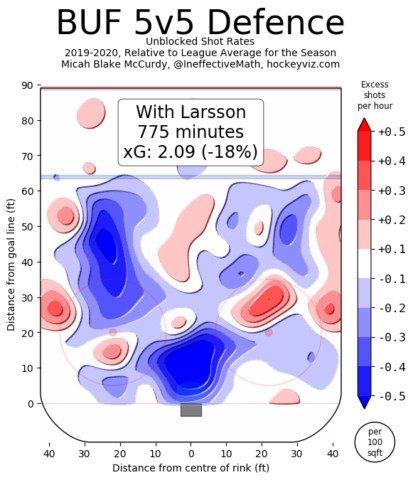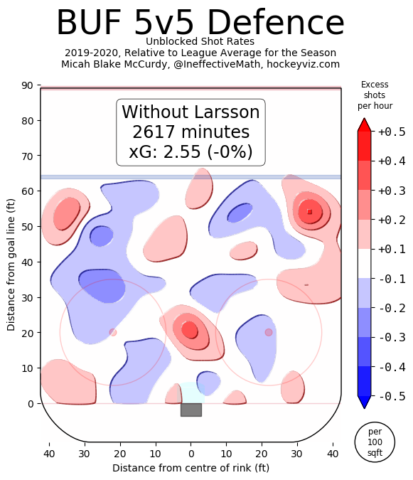
 Tyler Halsey
The Hockey Writers
Tyler Halsey
The Hockey Writers
72
Reads
0
Comments
Canucks Can Take Advantage of the Buffalo Sabres
Making smart, value trades and signings are what separates perennial Stanley Cup contenders from the pretenders.
Under general manager Jim Benning, the Vancouver Canucks have made plenty of moves – some hitting, many missing. Except for the JT Miller trade, it’s often the smaller, less flashy deals that push a team to the next level, like acquiring Josh Leivo or signing Zack MacEwen – two lesser moves that have and will make a difference for the franchise.
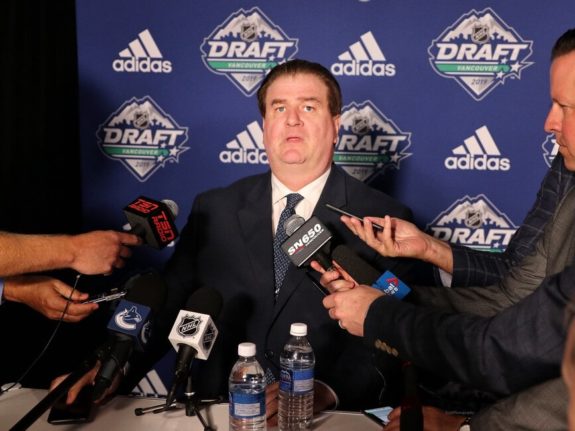
Enter the Buffalo Sabres. After clearing out their hockey operations department, major changes are underway. Players could be on the move as the team tries to change its identity to become a champion.
Related: Canucks’ Josh Leivo Is a Key Cog for the Future
Vancouver is in a position to take advantage of their 1970 NHL expansion cousin, by leveraging the chaos in Buffalo. If players are moveable, then there may be an opportunity for Benning to make a steal.
Johan Larsson
We’ll start with a lesser-known player, one who probably doesn’t carry a lot of value by name alone. Larsson is quietly a very strong defensive forward, a feat on a weaker team like the Sabres.
The blue areas indicate where low volumes of shots are taken and red means higher shot volume locations. Larsson was an elite shot suppressor at five-on-five last season; Buffalo fared 18 percent better with him on the ice defensively.
Based on the Goals Above Replacement metric from Evolving-Hockey, Larsson provided the second-highest total value on the ice, behind only captain Jack Eichel. Most of his value comes from driving the play and even-strength defence.
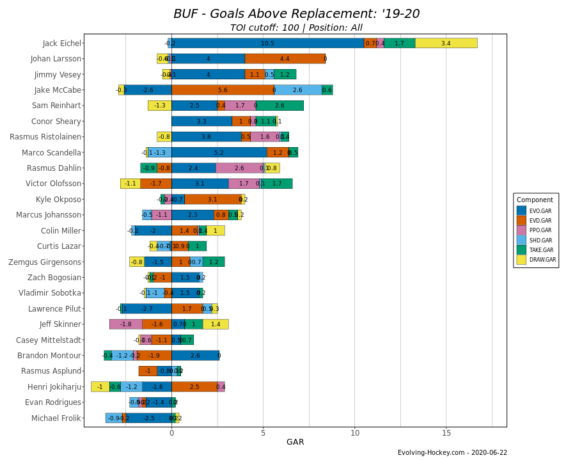
He’s a left-winger, but Buffalo used him at centre this season, showing his overall versatility. He won just over 48 percent of his draws – not bad for a winger. His versatility and defensive prowess have made him a strong penalty kill option as well, something the Canucks could use.
Larsson is a pending unrestricted free agent, and Evolving-Hockey projects his next contract will be along the lines of a four-year deal worth $3.1 million per season. As basically an offensive black hole (he had 18 points in 62 games this season), I don’t think he’ll earn that deal (even if it’s probably closer to what he’s worth). If he can be signed for a lesser dollar amount, the Canucks should be all over it.
Henri Jokiharju
In his first professional season split between the Chicago Blackhawks and their AHL affiliate Rockford IceHogs, Jokiharju looked like an up-and-coming stud.
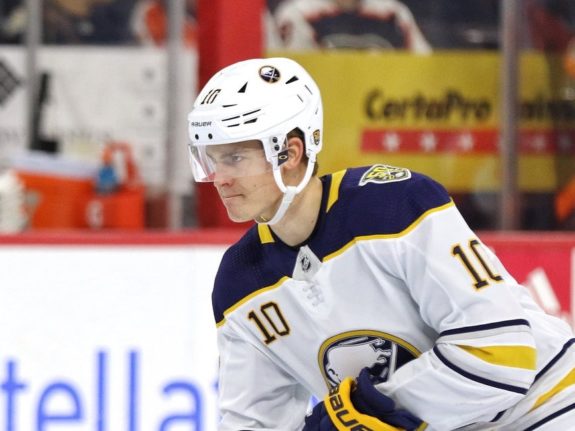
With the Blackhawks, he was a strong play-driver, consistently generating shots and chances. His defensive game was still that of a third-pairing defender, but that was acceptable given his age and offensive capability.
Following his trade to Buffalo, he became a completely different player. His defensive game improved under head coach Ralph Krueger, but his offensive game stagnated.
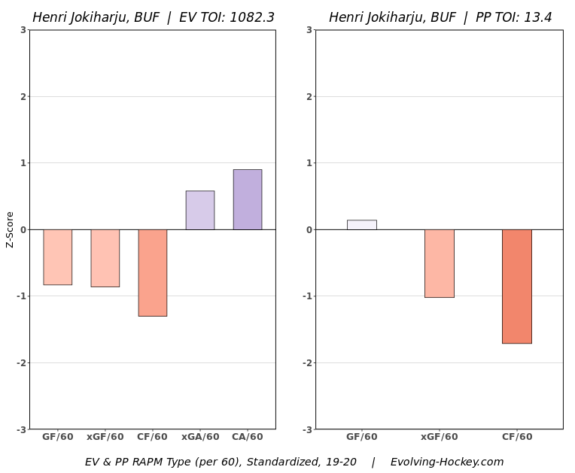
Essentially, he was also an offensive black hole. This is a bit of a trend with the 2019-20 Sabres (minus the Eichel line), so I wonder if Jokiharju is a product of his environment.
The Canucks have a prominent right-shot blueliner who’s about to become an unrestricted free agent. Jokiharju compares favourably to Chris Tanev in terms of passing data.
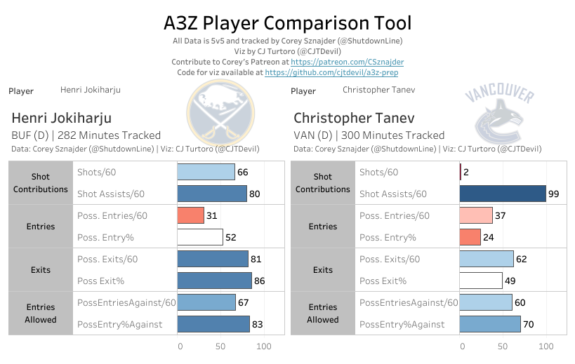
Jokiharju generates more offence without sacrificing defence. He is excellent at defending the rush and can effectively exit his zone once he stops the oncoming attack.
Estimating what Jokiharju would be worth in a trade is tough. One year ago, he netted the Blackhawks Alex Nylander, a prospect who needed a change of scenery after his development stalled in Buffalo.
Related: Canucks’ Top 10 Prospects Midseason Update
I can’t imagine the Sabres would want any roster player the Canucks would be willing to part with. Maybe something could be built around Jordie Benn, but there would have to be more going back to Buffalo. A future second-round pick plus a B-level prospect like Lukas Jasek or Guillaume Brisebois could do it too, but it might be hard to convince new general manager Kevyn Adams to give up on Jokiharju so quickly.
Sam Reinhart
I know what you’re thinking – this one shouldn’t work at all, and it probably won’t! The Sabres won’t part with Reinhart if they don’t have to, and the Canucks have no cap space to sign the pending restricted free agent. Evolving-Hockey projects he will sign an eight-year deal worth $8.75 million. That isn’t really in Vancouver’s range…unless there are compliance buyouts.
The Canucks could have space if they can freely get out of a contract or two (namely Loui Eriksson’s deal). However, Sportsnet’s Elliotte Friedman previously reported that NHL owners are completely against compliance buyouts, so this probably won’t happen. I was trying to cover all bases, and considering Reinhart is a Vancouver native, it was worth exploring. Benning should, at least, give Adams a call to check in on the young star.
Jake McCabe
The Canucks’ weakness this season was the blue line. Quinn Hughes is elite, Alexander Edler played well, and Tyler Myers was better than expected, but there are question marks after those three. McCabe would be a strong addition to solidify the left side of the defence.
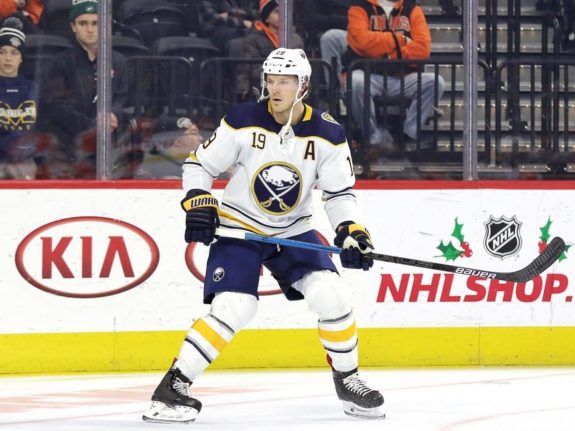
McCabe is a bit different from most Canucks defenders. He plays with a clear edge and isn’t afraid to use his size. His 91 hits are good for third on the Sabres this season, while his 90 blocked shots led the team.
Typically, those statistics tell me a player doesn’t have the puck often and is a possession drag on their team. While it’s true McCabe didn’t score a lot (we’ll call it the Buffalo Effect), he was an elite shot and scoring chance suppressor while generally pushing play in the right direction.
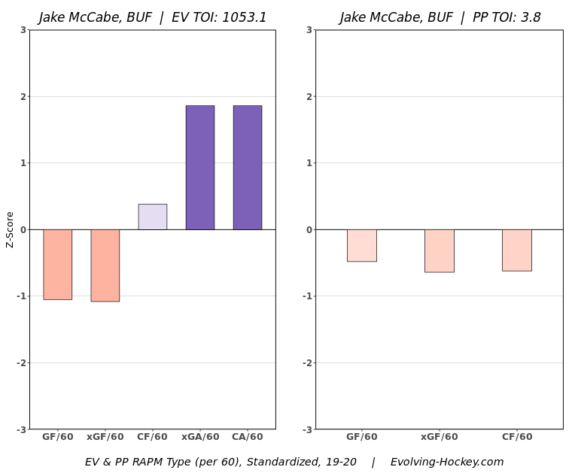
Based on Evolving-Hockey’s goals above replacement metric, McCabe generated the fourth-most overall value on the Sabres. Much of it comes from his strong defensive play and his penalty-killing abilities.
Where McCabe struggles is the transition game. He’s strong at defending, but once he has the puck, he makes mistakes. He has a tough time getting the puck out of his own zone – this could be why he has so many blocked shots too. Beware the limited sample size for Oscar Fantenberg, but he fared better than McCabe in transition. Not a great sign.
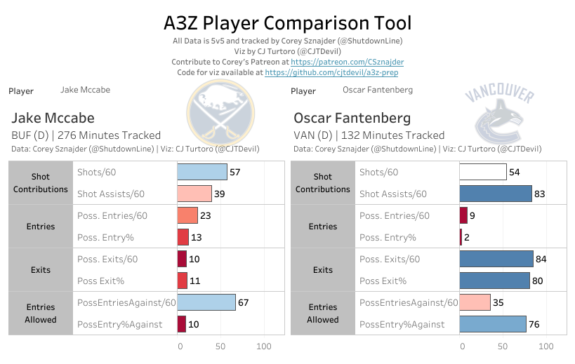
McCabe also has a tendency to make rather “loud” mistakes, ones that are obvious to the average home viewer – errant passes leading to goals, missed pucks and failed zone exits are all good examples. Vancouver has a few players who make louder mistakes (Edler and Troy Stecher come to mind), so I could see McCabe catching fan ire.
Realistically, McCabe is probably a good third-pairing defender on a Stanley Cup-contending team. His contract is also very palatable for that role, with one year remaining at $2.85 million. What Buffalo is seeking in a trade would be a complete mystery, but the Canucks would theoretically have the assets to get it done.
What Next?
The Canucks are hard-pressed against the cap without a compliance buyout or two, so any major move will be difficult. For this reason, moves like acquiring a player of Reinhart’s calibre probably aren’t realistic.
Larsson is a viable option in free agency so long as his cost isn’t too high. That said, the Canucks have lots of forward depth (assuming a healthy Micheal Ferland and Leivo returns), so I wouldn’t be willing to pay a premium for a position of strength.
If I could only make one of the moves here, I’d be trying to pry Jokiharju out of Buffalo. His sophomore season was lackluster, but that might help drive the acquisition cost down. He still has potential, and in a better system, I think he’d develop into a real player. McCabe is a good option, but I’m taking the younger player with more upside here. Regardless, Benning needs to be picking up the phone and trying to take advantage of a club in a state of turmoil.
The post Canucks Can Take Advantage of the Buffalo Sabres appeared first on The Hockey Writers.
Popular Articles

















































 Blackhawks Chicago
Blackhawks Chicago Panthers Florida
Panthers Florida Penguins Pittsburgh
Penguins Pittsburgh Rangers New York
Rangers New York Avalanche Colorado
Avalanche Colorado Kings Los Angeles
Kings Los Angeles Maple Leafs Toronto
Maple Leafs Toronto Bruins Boston
Bruins Boston Capitals Washington
Capitals Washington Flames Calgary
Flames Calgary Oilers Edmonton
Oilers Edmonton Golden Knights Vegas
Golden Knights Vegas Flyers Philadelphia
Flyers Philadelphia Senators Ottawa
Senators Ottawa Lightning Tampa Bay
Lightning Tampa Bay Red Wings Detroit
Red Wings Detroit Islanders New York
Islanders New York Sabres Buffalo
Sabres Buffalo Devils New Jersey
Devils New Jersey Hurricanes Carolina
Hurricanes Carolina Stars Dallas
Stars Dallas Jets Winnipeg
Jets Winnipeg Blue Jackets Columbus
Blue Jackets Columbus Predators Nashville
Predators Nashville Wild Minnesota
Wild Minnesota Blues St. Louis
Blues St. Louis Mammoth Utah
Mammoth Utah Ducks Anaheim
Ducks Anaheim Sharks San Jose
Sharks San Jose Canucks Vancouver
Canucks Vancouver


